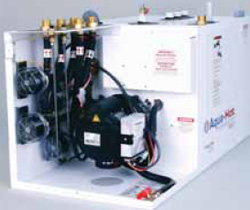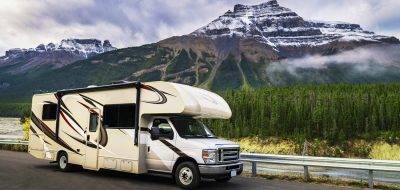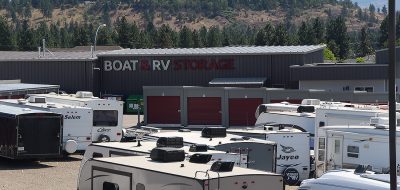
Now gasoline powered RV’s and trailers will be able enjoy the comfort and efficiency of hydronic heat. RV furnaces and hot water heaters may soon be things of the past on many rigs now that an affordable propane fired hydronic heating system is available. Aqua-Hot recently introduced its new 375-LP that can provide interior heating and a continuous supply of hot water. While plugged into shore power it is heated with a 1500 watt 120 VAC element for general light service which helps reduce propane consumption. During times requiring additional heat, or while no AC is available, it is equipped with a propane burner.
The unit and system is substantially lighter and requires less space than a water heater and furnace unit. It also delivered increased creature comforts with better heat distribution qualities. Propane consumption is stated as 0.35 gallons per hour.
The Aqua-Hot 375-LP will be offered by many RV makers and possibly as an option on some. Aftermarket installs should also be available starting at around $6,000 plus labor.
Here’s a link to there website: Aqua-Hot 375-LP
Keeping You Informed – Lug_Nut – Peter Mercer








Lug_Nut
John, Yes, they have been available for a few years. AquaHot and Oasis are two makes that offer diesel units. Thanks for the question and post.
John
Interesting product, is there a diesel alternative?
Lug_Nut
John Royer, There are several air handlers. The air handler consist of a radiator, which the heated glycol flows through, and a thermostatic controlled fan to move air through and into the RV. For example, I have 5 air handlers in my coach. One in the front of the coach, twoo in the midship area, one in the rear bedroom area and one in the basement. Each has its own pump within the system and only delivers flow to the units calling for heat. When sufficient heat is present in the air handler the fan starts.
Okay, heat strips make more sense running at 20 degrees F. Thanks for your questions and participation on this topic.
John Royer
Lug_nut, Thanks for the info on the operation of the hydronic system. Now it’s operation makes sense. Does the heated air come out in one place in the RV? If so then where is the thermostat? It’s placement seems to be a compromise. Guess I don’t understand how the warmed air from the exchange unit is ditributed equally through out the RV . I’d sure like the quiet fans!
…heat pumps? Don’t have any. I was referring to the electrical resistance coil strips in the roof mounted A/C units.
Thank you for your info and patience.
Lug_Nut
John Royer, The hydronic systems heats a closed loop of glycol. The glycol is pumped via thermostat controlled zone pumps to an air mover (Heat exchanger) which has a thermostatic controlled fan. The fans are quite quiet and distribute warm air as needed.
Heat pumps do not operate efficiently below about 35/40 F. If your heat pump is operating down to 20 degrees F. there is a problem. Your furnace should automatically start when the temperature goes down below about 35 F. if you are using your heat pumps. When the temperature rises back to about 35 F. the funace should stop and the heat pumps should again take over.
Thanks for your input.
John Royer
Wait a minute. If, as you note, ducting for heat is not needed, how does the Hydronic unit distribute the heat throughout the RV? In addition, with just two people in our 40 foot trailer, we always have enough hot water for the dishwasher and two back to back showers with our 10 gallon water heater running on electric only. We do have to wait about 15 minutes if we want to run the clothes washer right after dinner and two showers. But 6 grand buys about 15 years worth of 15 minute waits in my book. Additionally the heat strips in our two A/C units keep both ends of our unit plenty warm when the outside temp drops down to about 20 degrees F. The only time we seem to need the furnace is below that temp. Admittedly, we do not often “winter” camp, and only power the water heater with propane if we do an overnite in a Walmart parking lot. Ah well, as they say, if you build it, somebody will buy it !
Lug_Nut
bobberino, Engine heat exchangers have, and are, used in motor home. They are sold as motor aid and are normally located in the rear of the coach on those it is offered. Most people do run propane while underway for the frig. and somethings for interior heat. I can’t specifically say your is safe, but in general most are very safe for such use. Thank you for your input.
bobberino
I always wondered why the chassis radiator isn’t used more for coach heat while in motion. I remember the old school buses that had an additional heater in the back and I always assumed this was from engine cooling. Is it safe to run the propane furnace while underway?
Lug_Nut
gmas, That’s a great way to heat your unit. Most people don’t have anything that efficient. Thank you for sharing your experience on this topic.
gmas
My new trailer has a honda 6.5kw gen set… its water cooled and uses the engine water heat for co-gen and helps heat the trailer and its floor… if we want more heat it come in the form of very effecent electric heating.
Now I am sure that whole system didn’t cost 6 grand. But even if it did the whole trailer is heated, the power is provided and the kitchen is all electric so we don’t have to have ANY propane. Just diesel for the gen set.. which is real quiet running outside in its little home box. Now when we are hooked up to shore power we get electric heating and cooking. Again they did away with the propane, water heater and furnace. Much safer way to go and they say cleaner too. Even the refrig is now a common compressor type instead of the propane flame kind. Electronics and inverters have come a long way baby… The water is heated by the gen set AND a electric element so we never run out of hot water for them long showers. WE also get elect heat at the floor line with built in heaters for each section of the trailer (bedroom, cooking area and living area) Now at night we close off the rest of the RV and use just the bedroom heating. Thus much more effecent. Of course the additional dometic tripple pane windows are great too… no more ice forming on the inside in the moring with the old junk that was single glass.
So before I would go buy one of these.. I would look into making the RV more effecent and up to date putting my money into that system is antiquated … as the guy said.. your car has it already and it doesn’t cost 6K… 🙂
Basically the old way of heating the RV is under effecency review and I am sure we will see a lot of changes in the future.
Lug_Nut
Thomas Becher, Tractors use similar yes, but far more simple. RV hydronic not only heats the interior but also the water. A tractor only requires one air mover (Heat exchanger/fan) whereas as many as 6 or 7 may be needed in a RV. This also requires that the size much be much larger, say about 40,000 btu. It also needs to be far more robust than that of the intermittent tractor heater as it has to be capable of running under heavy loads for durations of time. It must heat the RV,, heat water while the washer is operating, supply steady heated water for showers, etc. This can amount to many hours of operation over the course of a year. If the unit fails in a tractor it is very uncomfortable in cold weather. If it fails in an RV pipes and appliances may freeze and the cost can be thousands of dollars.
Thank you for bring this up, but I guess you get what you pay for. Thanks for the great input.
Thomas Becher
Aux power units that 18 wheelers use is very similar and a heck of a lot cheaper than $6K. Bad point if you don’t already use diesel is that they do some make electric too I understand
Lug_Nut
Tom, I agree with you on the retrofit. It may not be financially feasible. However, the option to do just that is there. On new rigs it is probably quite cost justifying. Thanks for the input and the link.
Tom
Hi,
I remember a guy took a water heater and set it up to provide even heat using a radiator core in a ducted box. He claimed he cut his propane bills to 1/2 what they normally were and kept his travel trailer MUCH more comfortable than possible with the forced-air furnace. Oh, he also reduced his power consumption so he could run on battery even longer.
I agree that hydronic heating is the best way to go. But, I’m with others on the cost. $6,000 is WAY too much to throw at an existing rig. Maybe a newer, high-end model or someone with $6k to throw at it. I’m just not that someone. Now, where did I see that guy with the water heater conversion…
http://www.solarhaven.org/HPArticle.htm
tom
Lug_Nut
History Nut, They actually have been in diesel coaches for several years now. The “car heater” is actually an air mover (Heat exchanger with a fan) and there are 4 or 5 in some coaches. But, I guess you could build your own. Thanks for your interesting input.
Lug_Nut
trailertrashrick, Great question. The Suburban 35k RV furnace consumes about 0.33/0.35 GPH, or nearly identical. However, the hydronic also is looking after the water heat too. Additionally, due to the even heat, it may run far less as you don’t have to overheat the rear to keep warm in the front.
I’m glad to hear you enjoy the blogs. Thank you for taking the time to participate in this topic.
History Nut
I like the concept but not the price. I am surprised that this hasn’t been on coaches before now. My critique, other than price, is that if this unit fails, you have lost both hot water and heat.
Let’s see, if I add an electric AC heating element to my current water heater; put a pump(12V centirfugal to reduce vibration and noise) and a car heater core in my coach with some control modifications, I can do the same with about $500 in parts expenditure. I am not going to do this but it would serve the same functions.
If it came as a vertical stacked unit, it could replace my heater and water heater together.
I haven’t priced RV propane heaters but a tankless RV water heater is around $1500 so the price would only have to come down about 50% to be interesting.
🙂
trailertrashrick
This article brought up another question I’ve had — what is the propane consumption of a typical (35K BTU?) furnace?
If the hydronic is 0.35 gal/hr, what’s the “standard”?
As always, thanks for the Blog! I really enjoy these articles!
Lug_Nut
Dalton Tamney, Great input! Like many thing the cost may, in time, come down. But, can we afford to wait. If you want the comfort that this can deliver, don’t let price be the only obstacle, if it is within your budget. May be the cost is down to 4k in two years, what’s two years in your life worth if you really want it? Just a thought. Thank you for your challenging input.
Lug_Nut
Miles, I don’t think this is something you can necessarily cost justify. If you have ever owned a unit with hydronic heat, and spend enough time in cold weather, you may think it is well worth it. The even heat throughout the RV is unmatched. Thank you for your great input.
Dalton Tamney
I would think that considering the large number of existing units on the road, the industry would concentrate on providing these new concepts/technologies at a reasonable retrofit price. The market for such aftermarket items must be huge if they can be added at a reasonable cost. A price of $6,000 for this system just is not economical. Let’s see more products that can be incorporated into our existing units at a price that makes sense.
Lug_Nut
Kurt, I have to agree, it seem hard to justify as a retrofit. New units however, make sense. Thank you for your input on this topic.
Lug_Nut
Karl Vanhooten, I agree, the cost may exceed a reasonable amount on some rigs, but the technology may in future offer something similar, but cheaper. Thank you for your input.
Lug_Nut
Jim Spellman, Well, I think the price is already down somewhat. The diesel models were 10 – 12k a couple of years ago and the 375-LP was quoted in the mid 7k’s a month or so ago. But, the hydronic heat may be worth the dollars to some. Thank you for your comments on this topic.
Lug_Nut
David Handler, The 1500 watts is no problem as once it is up to temperature it only runs during demand cycles. It uses very little in a campground in the long run A stanard water heater would use more.. If on a new unit, the price may not be that high as they do not need a hot water tank or furnace and ducting. Thanks for your input.
Miles
I bought a 1500W electric space heater for $14 at Lowes… Doesn’t heat water, but I think I can afford $20 per year for the LP used for the stove, furnace and hot water. My water heater will also run on electric, but with 30A service I have to choose between two of three high wattage appliances. And gas heats the water so much faster than electric!
Kurt
At 5 times the price of replacement standard furnace and hot water heater, I’d sure like to see the calculations to justify the payback for this set-up!
Karl Vanhooten
Uh, no. $6,000 will buy a hellava lotta propane. Only for “Status Coach” owners – not for normal fiver, trailer and coach folks. What were they thinking?
Jim Spellman
Six Grand for a *possible* retrofit!?! Thanks, but no thanks. I’ll wait until supply and demand (and competition from other manufacturers) is such that the price takes a nosedive.
By then, of course, it may be better off to pass along the now older RV for a slightly newer model that would have it as standard equipment (as a rule, I never buy brand spanking new, given the huge depreciation one takes the moment it’s driven off the RV dealer’s lot).
David Handler
I would believe that this would put a strain on RV power at the post, raising the price of a site. At $6000.00, I could find much more satisfying additions to the RV to spend my money on.